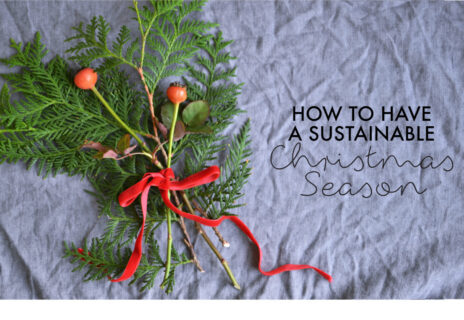5 Tips for a more Sustainable Christmas

5 tips to have a more sustainable Christmas from Geraldine Carton of The UseLess Project
- Food Waste
We waste an eye-watering amount of food each year, about 30% of all food produced goes to waste. When you think of all the resources and energy and land that is needed to make every morsel, not to mention all the people globally who are currently starving, it’s not hard to recognise that this is criminal. So much, in fact, that if “Food Waste” was to be a country, it would have the 3rd highest carbon and water footprint globally, after America and China.
To curb this, I’d recommend taking on a “war time” frame of mind with your food (within reason, of course!). Essentially, where at all possible let nothing go to waste. Remember that the freezer is your friend. Recognise the difference between “Use By” and “Best Before” labels and use your senses (ie give it a sniff) before you automatically throw something out – food doesn’t go off at the stroke of midnight, à la Cinderella!
- Eat seasonally
Here’s a fun one – guess which food item carries a higher carbon footprint in December: an avocado imported from Peru, or a tomato grown in an Irish greenhouse? The answer…. is the tomato. In fact, the carbon footprint of the tomato is X1.5 higher than that of the avocado, despite it having to travel thousands of miles to get to our boujee plate. The reason? Because in Ireland growing food out of season means we need the added help of a heated greenhouse, which produces a huge amount of CO2 to run. Eating seasonal, locally-produced food has a bigger impact than you could ever imagine, with regards decreasing your carbon footprint. Make it locally-grown, and you’re onto a real winner as this decreases the transport (and the emissions as a result) and also supports our local economy.
- Sustainable gifting
Most of the typical style of gifting of yore (glittery, glossy paper sealed with sellotape and ribbon etc) renders it completely single-use and destined for landfill. If you want to decrease your own contribution to unnecessary waste with your gifts, consider any of the following:
- Swap sellotape for rope/ twine/ reusable ribbon
- Reuse unripped wrapping paper/ newspaper/ source some unbleached brown paper
- Add a festive element with foraged shrubs/ greenery/ lavender stems etc
- Avoid glitter, glue and acrylic paints (pencils are good for decorating and ensures the paper remains recyclable)
- Go secondhand
Going secondhand is the best way to decrease your carbon footprint with clothing, homeware and other similar household items. The reason being that secondhand items don’t require any additional resources (water, land, C02, chemicals etc) to be enjoyed. The more we can engage in the circular economy and elongate the lifespan of an item, the more we can decrease its carbon footprint (e.g. giving a dress or a jumper an extra 9months of active wear can decrease its carbon footprint by 20-30%). Around the country there are loads of fantastic vintage shops, second hand consignment stores, preloved furniture warehouses where you can get some gorgeous items for yourself, or gifts for loved ones, not to mention the online options such as Depop (secondhand clothing) and Adverts.ie (fantastic for secondhand furniture and homeware).
- Support local
The importance of shopping local has never before been more apparent. One tiny sliver of brightness amongst the darkness of this pandemic is that people are finally starting to see the impact that their purchasing choices can have on small businesses. By choosing to support a small, local, ethical and sustainability-focused brand, you are using your money to vote for the kind of future you want to see, and you are minimising the need for additional transportation of goods as you go. What’s more, it’s been found time and time again that local businesses support local businesses, and that for every €100 you spend with a local business, €60 will stay in your local economy. This is a really important fact to consider when you think of the precarious future that the Irish economy is facing as it enters a new decade. Supporting local is not only good for the environment, but also for the economy, it’s a win-win all round.

